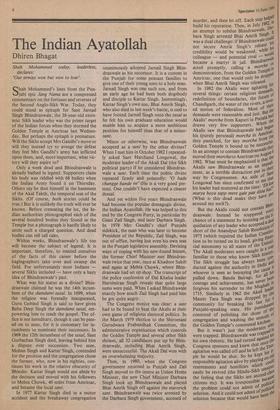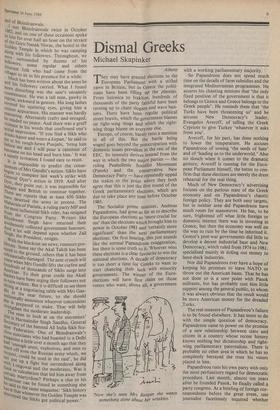The Indian Ayatollah
Dhiren Bhagat
Shah Mohammed today, leaderless, declares: `Our armies won but won to lose'.
Qhah Mohammed's lines from the Pun-
jabi epic Jang Nama are a compressed commentary on the fortunes and reverses of the Second Anglo-Sikh War. Today, they could stand as epitaph for Sant Jarnail Singh Bhindranwale, the 38-year-old extre- mist Sikh leader who was the prime target of the Indian forces when they stormed the Golden Temple at Amritsar last Wednes- day. But perhaps the epitaph is premature. Will the Sikhs accept Mrs Gandhi's move or will they instead try to avenge the defeat they feel Mrs Gandhi's army has inflicted upon them, and, more important, what vic- tory will they aspire to?
Only a week dead and Bhindranwale is already bathed in legend. Supporters claim his body was riddled with 68 bullets when the Indian Army found it on Thursday. Others say he shot himself in the basement of the Akal Takth, the temporal seat of the Sikhs. (Of course, both stories could be true.) But it is unlikely the truth will ever be known. Before cremating the lot, the In- dian authorities photographed each of the several hundred bodies they found in the Temple but a photograph is hardly likely to settle such a charged question. And dead bodies can tell tall tales.
Within weeks, Bhindranwale's life too will become the subject of legend. It is important, therefore, to remind ourselves of the facts of this career before the hagiographers take over and swamp the field. For unfortunately most Indians — several Sikhs included — have only a hazy idea of Bhindranwale's past.
What was his status as a divine? Bhin- dranwale claimed he was the 14th incum- bent of the damdami taxal. In 1699, when the religion was formally inaugurated, Guru Gobind Singh is said to have given Baba Deep Singh the damdami taxal, em- powering him to teach the gospel. The of- fice is not hereditary, though it can be pass- ed on to sons, for it is customary for in- cumbents to nominate their successors. In 1969 the 12th incumbent of the taxal, Sant Gurbachan Singh died, leaving behind him a dispute over succession. Two men, Mohan Singh and Kartar Singh, contended for the position and the congregation chose the former, who, now in his eighties, con- tinues his work in the relative obscurity of Bhinder. Kartar Singh would not abide by the decision and moved with his followers to Mehta Chowk, 40 miles from Amritsar, and became the local sant.
In 1977 Kartar Singh died in a motor accident and the breakaway congregation
unanimously adopted Jarnail. Singh Bhin- dranwale as his successor. It is a custom in the Punjab for some peasant families to give one of their young sons to a holy man. Jarnail Singh was one such son, and from an early age he had been both dogsbody and disciple to Kartar Singh. Interestingly, Kartar Singh's own son, Bhai Amrik Singh, who also died in last week's battle, is said to have foisted Jarnail Singh onto the taxal as he felt his own graduate education would enable him to acquire a more ambitious position for himself than that of a minor- sant.
Minor or otherwise, was Bhindranwale accepted as a sant by the other divines? When I met him in October 1982 I repeated- ly asked Sant Harchand Longowal, the moderate leader of the Akali Dal (the Sikh political party) if he considered Bhindran- wale a sant. Each time the politic divine repeated firmly and pointedly: '0 bade changge bande ne' (He is a very good per- son). One couldn't have expected a clearer denial.
And yet within five years Bhindranwale had become the popular demagogic divine, the Indian Ayatollah. He was helped to this end by the Congress Party, in particular by Giani Zail Singh, and later Darbara Singh. In 1978 Mrs Gandhi's chief Punjabi sidekick, the man who was later to become President of the Republic, Zail Singh, was out of office, having lost even his own seat in the Punjab legislative assembly. Devising ways of coping with his new-found leisure, the former Chief Minister met Bhindran- wale twice that year, once at Khadoor Sahib and again at Mehta Chowk, where Bhin- dranwale had set up shop. The transcript of the police confession of Dal Khalsa leader Harsimiran Singh reveals that quite large sums were paid. When I asked Bhindrawale exactly how much Zail Singh had paid him he got quite angry.
The Congress motive was clear: a sant had to be found to beat the Akalis at their own game of religious electoral politics. In the March 1979 election to the Shiromani Gurudwara Prabandhak Committee, the administrative organisation which controls the Golden Temple and several other Sikh shrines, all 32 candidates put up by Bhin- dranwale, including Bhai Amrik Singh, were unsuccessful. The Akali Dal won with an overwhelming majority.
Then, in 1980, when the Congress government returned in Punjab and Zail Singh moved to the centre as Union Home Minister, the new Chief Minister Darbara Singh took up Bhindranwale and played Bhai Amrik Singh off against the maverick sant. Bhindranwale was twice arrested by the Darbara Singh government, accused of p el build his reputation. Then, in July 1982' in an attempt to subdue Bhindranwale, Dar' bara Singh arrested Bhai Amrik Singh- It was a dual challenge: if Bhindranwale could notsecure Amrik Singh's release hiscredibility would be weakened, while 1111 colleague — and potential rival — "1_7; became a martyr in jail. Bhindranwa'or acted demonstration, from the Golden Templepromptly, calling a morcha in Amritsar, one that would only be droPPe' when Bhai Amrik Singh was released. In 1982 the Akalis were agitating for several things: certain religious dernaildsi redefinition of boundaries, the future Chandigarh, the water of the rivers, a revis: ed notion of federalism. Most of their demands were reasonable and just. But tile, drawn very morcha from Kapuri in Patiala ha° his (purely ype'resownasl Akalis saw that Bhindranwale had bgtill they panicked, for anin;mrcohrachina )upporters. When the Golden Temple is bound to be successfu'' In an attempt to contain Bhindranwale dleY4 moved their morcha to Amritsar on Augusle 1982. What must be emphasised is that di Akalis saw Bhindranwale as an Imxeir ment, as a terrible distraction put in way by Congressmen. An aide of ),70 Longowal has since confirmed to Ine,mt",,e; his leader had muttered at the time: 'PI, Altlfro trottSogie. marya hoya sapp mere gale paa ditto hat's (What is this dead snake they have Pu around my neck?). But the Akalis could not contain every' dranwale. Instead he scuppered li- chance of a statement by insisting on th,e,,01 quidation of any leader who accepted short of the Anandpur Sahib Resolution ; 1.973 (which required the Indian Coat_ tion to be turned on its head, givill,„ft-di• Qat autonomy to all states of the 0p The Akali moderates were caught in a Unstrap familiar to those who know Sikh htsto The Sikh struggle has always been, c,,0' ducted against the authority in Delhi 7, is a whoever is seen as betraying the eatl,s'his b pulled down. Banda Bairagi, for ll been courage and achievement, has never, forgiven his surrender to the Mugha ,der 1715. Similarly in 1962 the Akali Wale Master Tara Singh was dropped bY community for breaking his fast Or 0; Punjabi-speaking state. His punishluethe consisted of polishing the shoes Oils of congregation and washing the uten the Golden Temple's communal kitchen110 But it wasn't just the moderates "A to were trapped. Bhindranwale was traPPe",,is his own rhetoric. He had turned against his Congress sponsors and knew that once• agitation was called off and he left thel"Tr, pie he would be shot. So he kept responsible agitation alive by playing °mild resentments and hostilities which e". 0; easily be revived (the Hindu-Sikh tensl,°„ss the feeling that the Sikhs are second-etuase citizens etc). It was irresponsible hee.a.cal the problem could not admit of Political solution. And it could not admit of P°11"the solution because that would have been §Pee'attn. 16 June 1984 end of Bhindranwale.
I met Bhindranwale twice in October
1982, and on one of these occasions spoke to hirn for over half an hour on the terrace of the Guru Nanak Niwas, the hostel in the Golden Temple in which he was camping along with his followers. Throughout, we fwere surrounded by dozens of his ollowers, some regular and others itinerant folk who had come from the villages to sit in his presence for a while. Much has been written about the arms he and his followers carried. What I found More disturbing was the sant's unsaintly untenance. He was a tall man, gawky in repose, awkward in gesture. His long lashes ov.ered his squinting eyes, giving him a sinister aPpearance. His manner was hardly reassuring Alternately crafty and enraged, 11.e exuded no peace. And there was a gruff iv„191enee in his words that confirmed one s Tl.tIal impression. 'If you find a Sikh who winks liquor and wears a kirpan,' he said to 131e in his rough-hewn Punjabi, 'bring him aeonkerosene on his head and burn him.' It was invitation I found easy to resist. l ts impossible to predict the conse- iuences of Mrs Gandhi's action. Sikhs have Gft) to compare last week's strike with ileueral Dyer's action in 1919. And after 1,1.1.' they point out, it was impossible for Indians and British to continue together. ,"ere are reports that at least 650 Sikhs 'vve deserted the army in protest. The „.allaraja of Patiala, a ruling party MP. and tine most influential Sikh ruler, has resigned „1.3tri the Congress Party. Writers like Nn.ushwant Singh have returned their Singh, the President, resigns.
the blackout on news, rumours pro- _ateate. Some say the Akal Takth has been substantially to the ground, others that it has been come damaged. The next crunch will
nundrhundreds when Mrs Gandhi lifts the curfew into ;‘treds of thousands of Sikhs surge into. irlisar. To their great credit the Akali t'eaders have been urging their followers not s. turn violent. But it is difficult to see them dh ns. at a negotiating table with Mrs Gan- .. In the near future, so she should she ally announce whatever concessions s, e Is prepared to make. That will help `1.,,engthen the moderate leadership. sidth.e man to look at on the extremists Secretary Is Harmainder Singh Sandhu, General d„ecretarY of the banned All India Sikh Stu- dent Federation. One of Bhindranwale s. `.lose associates who had boasted to a Delhi
a little over a month ago that they
wads encnIgh arms, explosives, and men to s, off even the Russian army which, we ilaospect, could be used in the raid', he did with uP a fight but surrendered along -ongowal and the moderates. Was it certain or calculation that led him away from thartYrdom? Perhaps a clue to his he leur can be found in something else h_ said to the same magazine: 'Sikh history has th
—at whenever the Golden Temple was destroyed the Sikhs got political power.'
Q." a lot will depend upon whether Zail rldu°uslY collected government honours.













































 Previous page
Previous page